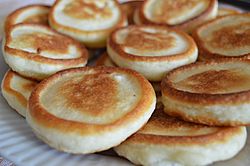Oladyi facts for kids

Oladki
|
|
| Type | Pancake |
|---|---|
| Main ingredients | Batter, raisins, apples |
Oladyi (say "oh-LAH-dee") are yummy, small, and thick pancakes or fritters. They are a very popular treat in Russian and other Eastern European countries. The dough, called batter, for oladyi is usually made from flour, eggs, milk, salt, and sugar. Bakers often add yeast or baking soda to make them fluffy.
Sometimes, the batter is made with kefir, soured milk, or yogurt. You can also find them with tasty additions like chopped apples or sweet raisins inside.
Serving Up Oladyi
Oladyi are often served with smetana, which is a type of sour cream. They are also delicious with sweet toppings. Think about yummy jam, fruit preserves, or golden honey.
Sometimes, people eat savory versions of oladyi. These might be served with caviar, just like blini (another type of thin pancake).
Different Kinds of Fritters
The word oladki in Eastern European cooking can mean more than just these specific pancakes. It can also describe other types of fritters. These fritters are made with different main ingredients.
For example, you might find:
- Potato pancakes (called kartofelnye oladyi)
- Carrot fritters (morkovnye oladyi)
- Bean pancakes (oladyi iz bobovykh)
- Rice pancakes (risovye oladyi)
- Summer squash fritters (kabachkovye oladyi)
Syrniki are another popular dish. They are pancakes made from quark (a type of fresh cheese). Many people consider syrniki to be a kind of oladyi too.
Where the Name Comes From
The word oladya is very old. It first appeared in writing around the year 1470. This was in Old East Slavic, an old language.
The first time oladyi were mentioned as a dish was in the Domostroy. This was a Russian book from the 1500s. It gave rules and advice for running a household.
The word oladya comes from an Ancient Greek word. That word was eladion, which meant "olive oil" or "oily substance." This makes sense because oladyi are often fried in oil.
You might also know the word latke. This word is used for potato pancakes in Jewish cuisine. It actually comes from the Russian word oladka.
 | May Edward Chinn |
 | Rebecca Cole |
 | Alexa Canady |
 | Dorothy Lavinia Brown |

